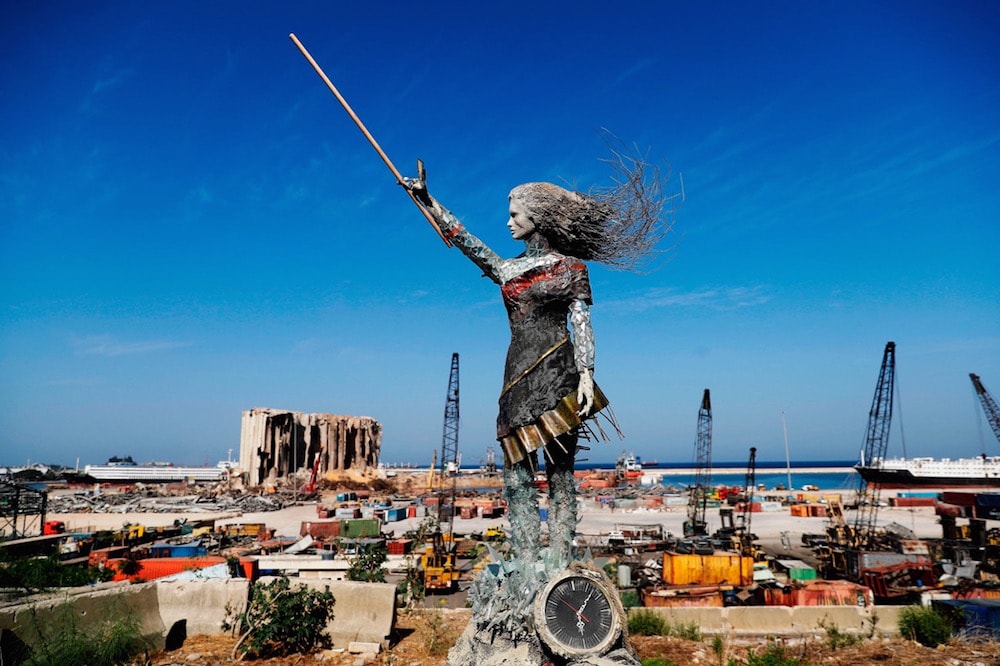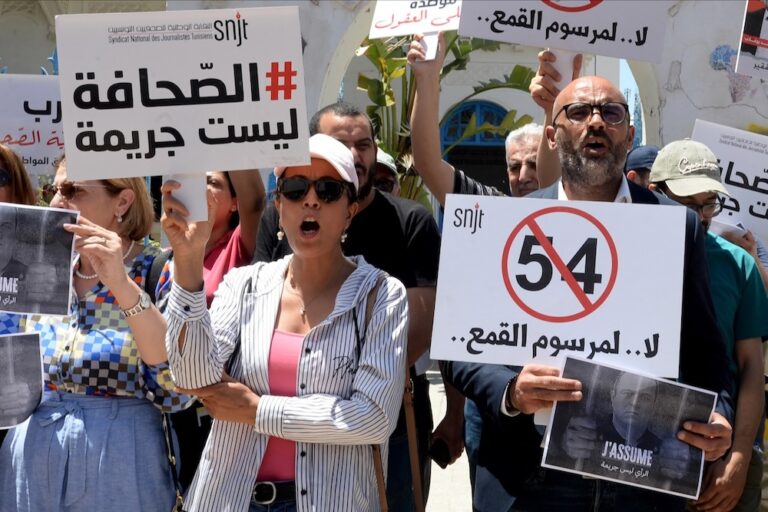October in Middle East and North Africa: A free expression roundup produced by IFEX's Regional Editor Naseem Tarawnah, based on IFEX member reports and news from the region.
As the world continues to battle a second wave of the COVID19 pandemic, authorities in MENA are clamping down on freedom of expression and assembly in an effort to avoid a second wave of the protests that dominated late 2019.
Unfinished revolutions: from Lebanon to Iraq
In Lebanon, the country’s year-long journey from hope to despair has been undeniable. The dismantling of the traditional political establishment that anti-government protesters hoped to achieve back in October 2019 has since proven to be an increasingly herculean undertaking.
It has been a year mired with government resignations, violent repression of free expression and assembly, and a contested political vacuum that has left unstable leadership amidst a collapsing economy, increased electricity blackouts, and a port explosion that claimed the lives of at least 200 people.
The fraught situation has made the return of Prime Minister Saad Hariri, months after his resignation, all the more a tragic irony in the narrative of Lebanon’s uprising. How long he will remain in power remains to be seen as he contends with worsening economic conditions, and an increasingly angry, resilient, and battle-hardened protest movement.
There is perhaps no better symbol of Lebanese resilience in these fragile and fractured times than a statue recently erected in Beirut to memorialize the victims of the deadly port blast. The statue of a woman raising a torch to the sky was designed by Lebanese artist and social activist Hayat Nazer, and was constructed out of twisted metal, broken glass, and mementos contributed by the local community.
That resilience will be necessary in the months to come. Between a new-old prime minister, and an investigation into the port blast leading to no accountability for top-level political and security officials, continued protests and political opposition seem inevitable, as is the repression dissenters will likely face.
According to a recent report by the Maharat Foundation, violations against freedom of expression and assembly have been rife in the wake of the August port blast. This includes authorities restricting access to information and blocking websites, as well as attacks on protesters, journalists and activists, all of whom have faced interrogations, arrests, and defamation lawsuits for their free expression.
Criminal defamation laws have been widely relied upon as a repressive government tool to silence online dissent in Lebanon, punishing critics of the army, president and public officials with up to three years of imprisonment. Authorities have also taken to infiltrating platforms like WhatsApp groups that activists use to organize, in an effort to identify and persecute protest leaders.
Over in Iraq, peaceful protesters also returned to the streets to mark the one year anniversary of anti-government protests. Like Lebanon, the country has endured a year of hardship and unfulfilled promises that have left rampant government corruption, economic mismanagement, and rising unemployment unaddressed. Like Lebanon, Iraq has also seen a government toppled followed by increased repression, alongside a growing health crisis and a crumbling economy.
What perhaps sets Iraq apart has been the degree of ongoing violence inflicted by security forces as well as armed militia groups that have routinely targeted protesters, infiltrated protests, and carried out numerous kidnappings and assassinations of critics over the past year. During this time, an estimated 600 protesters were killed and 30,000 were injured, with security forces using live ammunition and tear gas to systemically target protesters. The Gulf Centre for Human Rights (GCHR) has extensively documented these violations in its periodic reports, providing an invaluable chronicle of the plight journalists and media face in the country.
To silence critics, the penal code has been frequently used since the October 2019 protests began. Authorities ordered temporary suspensions of several television and radio stations for violating media licensing rules, including Reuters, which was temporarily suspended after questioning official figures of COVID-19 cases in the country. Defamation laws have also been frequently employed in cracking down on journalists and independent media, who face a criminal process where abuse, torture, and forced confessions have been documented. The exploitation of the penal code also extends to Iraqi Kurdistan, where authorities there launched a campaign of arrests targeting activists and journalists for their online free speech.
Detainments and protest prevention
Despite ongoing COVID 19 outbreaks in overcrowded jails across the region, prisoners of conscience continue to linger behind bars. In Saudi Arabia, imprisoned women’s rights activist Loujain Al-Hathloul has gone on another hunger strike to protest her prison conditions. According to GCHR, she has been denied regular contact with her family, and subject to solitary confinement. Loujain’s sister, Lina A-Hathloul, spoke to BBC Newsday about the hunger strike:
In Algeria, as a new constitution emerges that critics say does little to advance and protect civil liberties, rights organizations called for the immediate release of critically-ill activist Abdallah Benaoum, who has been in pre-trial detention for eleven months for his Facebook posts criticizing authorities.
In Egypt, ahead of the protests’ one-year anniversary, security forces launched a fresh crackdown that included mass arrests in an effort to stop scattered protests from gaining momentum. The move is destined to increase the country’s prison population, where activists like Alaa Abdel Fattah, and human rights defenders Mohamed Baqr and Mahienour El-Massry remain amongst hundreds arrested in the aftermath of last year’s September protests, and have since been kept in pre-trial detention on unfounded charges.
In early October, prisoners in Tora prison went on a hunger strike to protest rampant abuse and neglect and the lack of medical care. The prison is home to prisoners of conscience like blogger Mohammed “Oxygen”, who according to the Arabic Network for Human Rights Information (ANHRI) has suffered abuse and neglect while being held in pretrial detention since his re-arrest in September 2019, as well as opposition political prisoner Dr. Magdy Al-Safty, who died last month after being denied medical care.
In what some activists believe was a move designed to send a message to potential protesters and striking prisoners, authorities carried out a staggering 49 executions over the span of just ten days. The mass executions, which social media users dubbed a ‘massacre’, included 15 political prisoners, raising the total number of political prisoners killed under Sisi’s rule to 79.
Authorities also continued to pressure critics by arresting and threatening their family members. Most recently, the founder and Editor-in-chief of the independent news website Daarb, Khaled El-Balshy, has seen two of his colleagues arrested, as well as his brother, Kamal El-Balshy. Judicial authorities charged Kamal with spreading false news online and participating in demonstrations marking the anniversary of the 2019 protests.
The rapid deterioration of human rights amidst the ongoing pandemic compelled 278 European and US lawmakers to publicly call on President Abdel Fattah El-Sisi last month to release all prisoners of conscience who have been imprisoned solely for exercising their human rights.
While renewing detentions has become a routine way of keeping prisoners of conscience behind bars, Egypt’s Justice Ministry declared last month its plans to conduct detention renewals electronically rather than holding in-person court sessions. According to ANHRI, the move undermines basic due process, denying prisoners the ability to file complaints regarding ill-treatment, abuse or denial of medical care they face in prison, without fear of repercussion from prison authorities.
Being detained on vague charges and unable to hold jailers accountable for their actions poses an even greater threat to members of the LGBTQI+ community. According to a new HRW report, “security forces routinely pick people off the streets based solely on their gender expression, entrap them through social networking sites and dating applications, and unlawfully search their phones,” using their content to justify their prolonged detentions, where activists and members of the community have faced torture, beatings, and sexual violence while in custody.
One bright spot in Egypt was last month’s release of satirist Shady Abu Zaid, who had spent more than two years in pretrial detention.
Iran: Blood, shutdowns, and torture parades
In Iran, prominent human rights activist Narges Mohammadi was also released from prison last month after growing fears for her health gained widespread attention following a hunger strike she launched to protest prison conditions.
However, the fate of Iranian lawyer and human rights advocate, Nasrin Sotoudeh, and the thousands of other prisoners of conscience that face systemic abuse and denial of medical care in the midst of a pandemic, remains unknown.
In the weeks leading up to the one year anniversary of November 2019’s anti-government protests, authorities have launched a wave of arrests that rights groups say are designed to intimidate Iranians and prevent potential protests. Last year’s protests resulted in a brutal crackdown on anti-government protesters that saw hundreds killed and thousands arrested. According to a new report from ARTICLE 19, much of this crackdown was facilitated by a nationwide Internet shutdown by Iranian authorities that lasted for an unprecedented six days, restricting access to critical information and the ability to safely communicate and document human rights abuses.
Last month, after videos showing security officers parading, beating, and psychologically torturing detainees in the street went viral on social media, Iran’s judicial authority issued an order banning torture, “forced confessions”, and other violations of defendants’ rights, in the name of “transparency”.
Such pledges are more likely to be window-dressing and do little to dismantle Iran’s ‘torture epidemic’. Even prisoners that have recently reported mistreatment in the country’s detention facilities have found new charges levied against them by the judiciary in retaliation. As HRW Iran researcher Tara Sepehri Far notes: “the judiciary’s recent rhetoric on ‘transparency’ rings especially hollow if prosecutors silence alleged torture victims rather than impartially investigating their claims.”
In Brief:
Tunisia: Parliamentary discussions around a series of controversial bills ahead of the 10-year anniversary of the country’s revolution sparked outcry from civil society. These include a bill granting security forces immunity from prosecution for the use of lethal force, as well as an amendment to the Freedom of Audiovisual Communication Law that would end licensing for radio and TV stations. Activists say the former bill would further entrench a culture of impunity, while the latter would open the door for foreign powers to exert unchecked financial influence on public opinion. As of this writing, both measures have been momentarily tabled by parliament.
#Tunisia: journalists, civil society and political party representatives rallied on Tuesday outside @ARPtn annex building in protest against the amendment to Decree-law No. 116 on the organisation of the audiovisual sector tabled by Al Karama coalition. #TAP_En pic.twitter.com/tEORmQ6yLO
— TAP news agency (@TapNewsAgency) October 20, 2020
Yemen: Five journalists facing execution were also finally released as part of an exchange of prisoners between the Houthi authorities and the Saudi-backed government of Abd-Rabbu Mansour Hadi.
Palestine: Several IFEX members joined a joint oral intervention at the UN Human Rights Council last month, expressing concern over Israel’s targeting of Palestinian rights defenders and specifically its intention to revoke the permanent Jerusalem residency of lawyer Salah Hammouri. Meanwhile, Palestinian journalist and documentary filmmaker Abdulrahman Dhaher was detained by Israeli soldiers just weeks after being released by the Palestinian Authority.
ICYMI (In case you missed it…)
Events worth checking out:
7amleh hosted a webinar on Palestinian digital rights, as well as a webinar on its recent study on fake news in Palestine.
The Cairo Institute for Human Rights Studies hosted a webinar on Algeria’s constitutional referendum: “November 1st Constitutional Referendum: A Step Backwards for Democratic Aspirations”.
GCHR and Amnesty held an online event called “The Prisoner and the Pen”, featuring the beautiful writings, songs and poetry of imprisoned human rights defenders, and also to celebrate relevant art of activists from the region.
Social Media Exchange will be hosting its annual Bread&Net event virtually this year featuring diverse discussions on digital rights, security, and policy in MENA.



